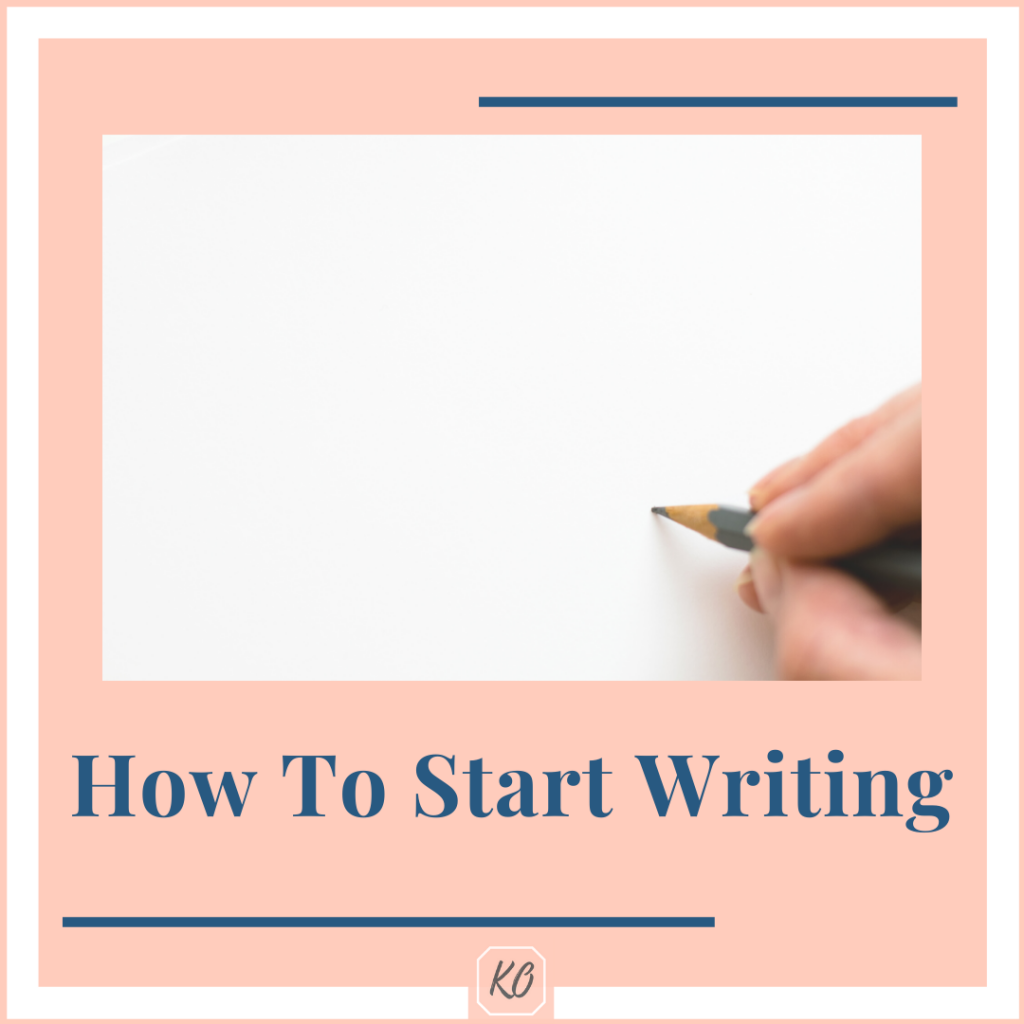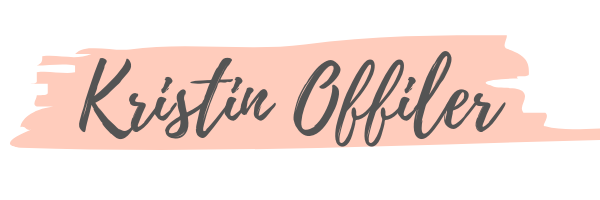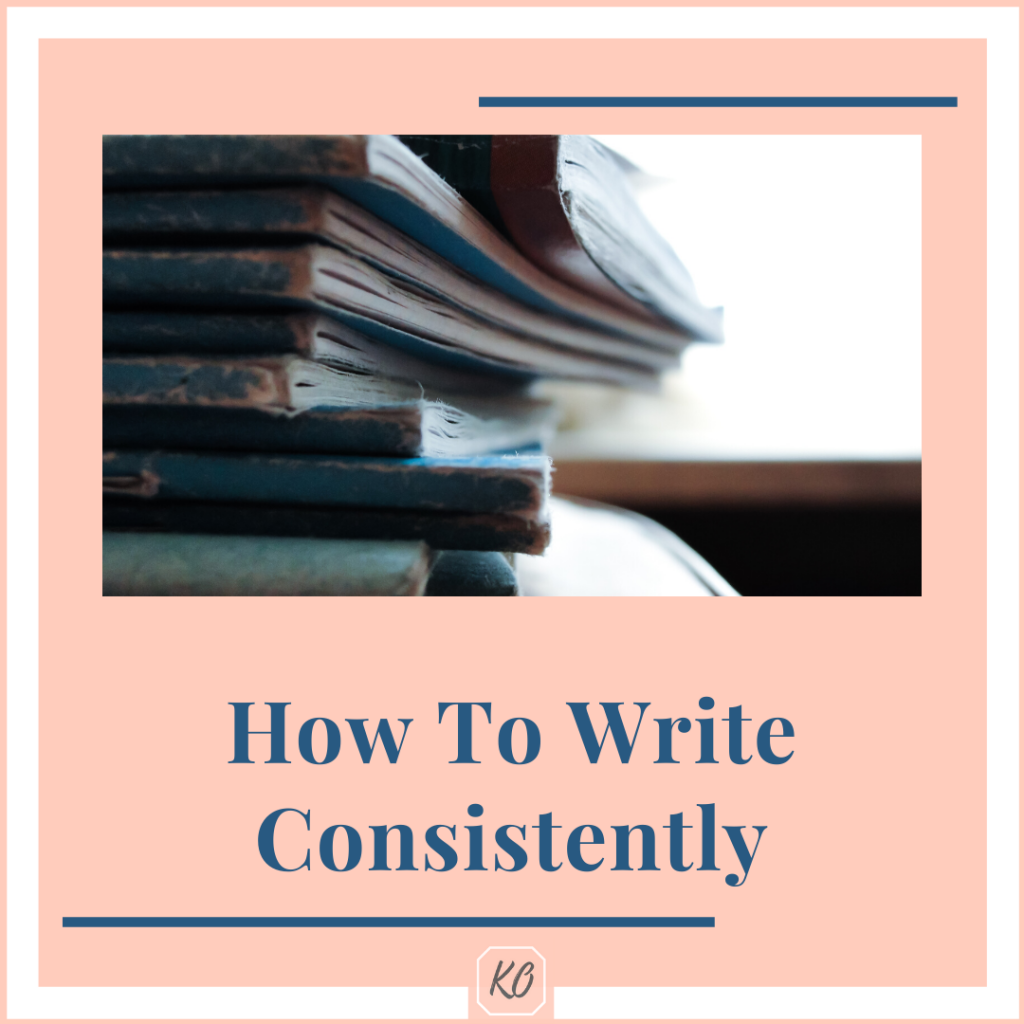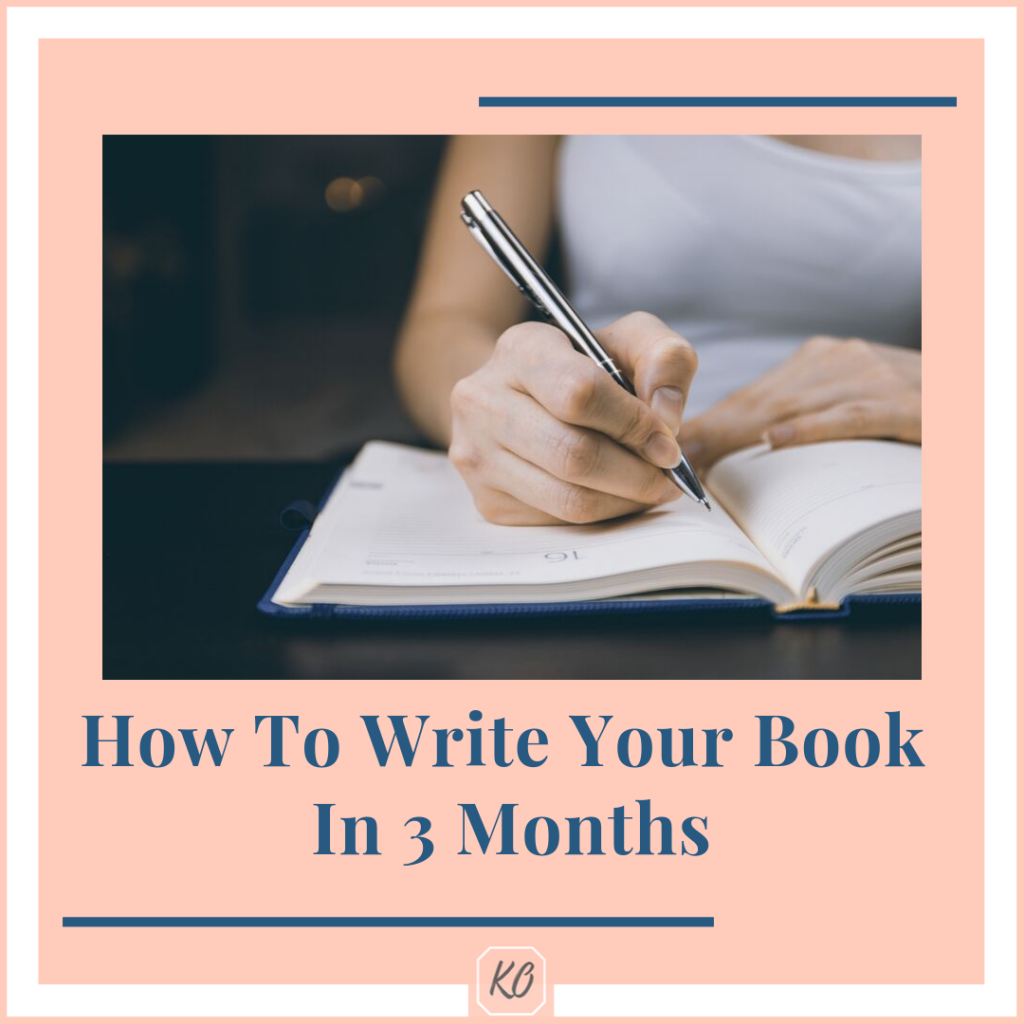Where do ideas even come from?
When a good one hits, it feels like a divine gift. But when our creative well runs dry, it seems like good ideas are impossible to come by.
The thing is, you can write from a place where ideas are always available, even when you’re feeling blocked and uninspired. I promise! There are always ideas available to you if you know how to find them.
Here are three ways to come up with story ideas when you think you’ve run out of them.
Get Curious
I’ve never written a good story after sitting at my computer and staring at a blank page. There’s never once in my fourteen years of writing been a time when I’ve forced a good idea out of thin air.
I have, however, had great ideas come to me when I’ve gotten genuinely curious about something.
In one case, I spent four and a half years writing and revising a novel that began out of curiosity. While doing a writing exercise, I saw a specific image in my mind that I couldn’t shake. I kept wondering about it, feeling desperately curious about the people in the scene, so I wrote to understand it… and from that curiosity, an entire novel idea was born.
If you’re curious about even the smallest thing, like a word or image or feeling, you can turn it into a big idea.
Curiosity is a clue about what interests you. It’s a sign that there’s something for you to uncover. Follow your curiosity as far as you possibly can, even if it seems “too small” to be a big idea. Oftentimes, the smallest detail sparks the biggest inspiration.
Experiment
Sometimes we feel like we’re out of ideas because we’ve been doing the same thing for so long, we’re just bored.
A lack of ideas can sometimes just be a sign you’re in a writing rut. To get out of that rut, try experimenting with the things you read and write. Pick up a book in a genre you never read. Write in a style you’re a little bit afraid to try.
Go as far outside your comfort zone as possible and play with the form, the style, the language. Give yourself permission to write what’s forbidden or scary. Be bold and as unlike yourself as possible.
You don’t have to ever see it in print, but the process of doing it could very well flood you with ideas.
Even if the product of your experiment isn’t something you stick with, there’s a chance the process will spark an idea you can stick with.
Revisit Your Own Ideas
In my writing life, for every ten story ideas I have, only one ever sees the light of day. That might be different for you, but the point is this: you probably have generated ideas in the past that you never explored further.
If you keep idea kernels or scraps of stories in a document or notebook, somewhere now is the time to dig it out and read through it.
Some of those bits and pieces will be useless. They’ll make no sense to you now or they’ll just seem silly or uninteresting or not worth your time.
But there may also be some exciting ideas in the mix that you’ve completely forgotten about. You can only take action on so many projects at once (if you’re me… it’s just one at a time), so perhaps you’ll stumble across an idea you were previously excited about but didn’t have the time to work on.
Just because it’s an old idea doesn’t mean it’s bad. You might’ve just needed to wait for the right time to pursue it.
How do you come up with ideas for your writing? Tell me below!
And don’t forget… join me on Instagram for new content all month long about how to come up with story ideas.
If you’re already on my newsletter list, you can find your downloadable PDF already in your inbox! Just look for my newsletter, open it, and scroll down. Every monthly blog post will come with a downloadable resource to help you make the most of that month’s topic, so be sure to sign up here if you want in!
You don’t have to write every day to be a “real” writer.
If that’s one misbelief holding you back from a great writing life, feel free to let it go.
The reality is, consistency is what matters.
And for each person, consistency will mean something different. Maybe for you, consistency is writing daily, or three times a week, or every single weekend. Maybe it’s writing on your lunch breaks four days a week or getting up early to write every other morning.
You’re a real writer if you write, not if you adhere to “rules” about how to be a creative person. Skipping a day of writing doesn’t negate all the previous work you did.
But how do you build consistency so you’re writing regularly if that’s something you have yet to master? Here are a few easy steps.
Create Momentum
One reason some people write daily is that it generates momentum, and once you’ve got some momentum behind your writing, it’s easier to write regularly. It’s also easier to combat resistance and self-doubt.
While you do not need to write daily to feel forward motion with your work, it can actually be a great tool in the beginning.
When I haven’t written in a while or I’m feeling kind of resistant or stalled out, that’s usually a good sign I need some momentum. So in that case, I’ll commit to writing daily for a certain period of time rather than “forever.”
I know there are benefits to writing daily, but it can feel defeating to believe “real” writers write every single day without fail. That’s just not true.
I set the bar low and give myself a lot of grace, but still make sure I’m writing something daily for my selected block of time. The habit of sitting down to write for 21, 50, 100 (or whoever many) days pushes me forward and actually makes writing easier.
Once I’ve gained momentum, I don’t have to sustain a strict daily writing practice.
However, I do need to stay connected to my writing, so I try to not go more than a couple of days between writing sessions. Anything longer and the process of re-entering the work is much harder for me. You may notice this too, or maybe it’s easier for you.
Either way, I think of my writing practice as me holding a thread that’s connected to my story.
Each non-writing day that passes, I feel my grip on the thread get a little looser. At some point, I’ll drop the thread entirely and have to work to find it again.
So I hold onto that thread to keep steady forward momentum and help my writing practice feel smoother.
Schedule Your Writing Time
This isn’t a revolutionary tip, but it does work.
I like to plan my writing in two phases: the overall time I think a project will take, and then the weekly steps I can take to get there. Scheduling it is how I get the writing done!
For example, while revising my novel, I work off a master revision schedule that tells me which chapters I’m working on each week and when the entire process should be wrapped up.
Then each week, I zoom in a bit closer and write out the specific things I need to do that week and add it to my schedule. I generally have the most time for writing on Wednesdays, so I might schedule two chapters of revision for that day, while the rest of the week I just focus on smaller sections within each chapter.
Whatever your process looks like, the key is just that you add your writing time to your schedule.
Make appointment blocks in your Google calendar and keep those meetings with yourself the same way you’d keep a meeting with someone else.
Your time is just as precious as someone else’s.
Or maybe you’ll take a looser approach and plan out a word count goal for the week. If you want to hit 1,000 words by the end of the week, designate how many words you’ll try to write on certain days and add it to your to-do list. Monday – 500 words. Thursday – 200 words. Saturday – 300 words.
Bottom line: help yourself be consistent by scheduling your writing and keeping those appointments like you would keep them for anyone else.
Be Flexible and Curious
The biggest problem with the adage that you must write daily to be a writer is that it’s inflexible.
And what most writers need is a lot of grace, flexibility, and curiosity in their life rather than rigid “rules” that only serve as a way to stoke perfectionism.
Writing isn’t something you’ll ever perfect. But what you can do is improve and learn and get better the more you practice.
If you want to write consistently, you must be flexible with yourself.
Be willing to begin again when you lose grip on the thread connecting you to your words.
Be curious about what you’ll discover if you commit to writing with regularity. Not just what you’ll discover in your own story, but within yourself.
Be excited to make a promise to yourself and stick with it, and be open to the possibility that you’ll build momentum for a while and then lose it, and need to start over. Be ok with all of it.
There’s no need for either/or thinking as a writer. This is an art form, a craft. You’re an artist who is learning and practicing, failing and succeeding.
You don’t need to sit at a desk and write for three hours every single morning to be an artist.
But you do need to sit with your work often, and with an open mind.
If you want to see progress, you’ll need to write regularly, even when it feels impossible. Even when you think you have nothing to say. Even when you’ve been away from the page for too long.
And don’t forget… join me on Instagram for new content all month long about how to write consistently.
Plus, you can download your free infographic on How To Write Consistently here.
If you’re already on my newsletter list, you can find your downloadable PDF already in your inbox! Just look for my newsletter, open it, and scroll down. Every monthly blog post will come with a downloadable resource to help you make the most of that month’s topic, so be sure to sign up here if you want in!
Tell me, do you have any habits that help you write consistently?

If you’re human, you’ve probably experienced this before.
You want to start writing, whether it’s for the first time ever or for the millionth, but the prospect of actually taking the first step is daunting.
Although it’s not difficult to pick up a pen or open a blank Word document on your computer, it is hard to mentally get out of your own way sometimes.
If you’re torn between the desire to write and a ton of resistance to starting, read on.
Identify What’s Stopping You And What You Want To Write
Sometimes resistance to starting something new stems from an unclear idea about what exactly you’ll write. Our brains like certainty and predictability. When something is new or uncertain, our natural instinct is to hit the brakes before we even get going.
But as you can imagine, this is super unhelpful for your writing life!
First thing’s first: what’s at the root of your resistance? What’s underneath your mental chatter? Fear of failure? A boatload of self-doubt? Concern that everyone will hate what you write?
Even if you only have a vague idea of why you’re having trouble starting, it’s better than having no idea. For example, maybe you’re secretly terrified that you’ll never actually finish what you want to write and all of your efforts will be pointless. And maybe you’re also scared to let yourself down.
Once you know what’s fueling your resistance, you can question its validity. Is it true that you won’t finish this? If you don’t finish it, is it true that your efforts would be totally negated? What’s the worst that you can imagine happening if you do let yourself down?
You don’t have to write this out or spend tons of time on it. While you’re walking or doing other mindless tasks, you can let these questions marinate. The more you question your resistance and approach it with curiosity, the easier it is to overcome.
After that? Identify what you want to write!
Are you hoping to work on writing prompts for a while for the practice? Do you want to work on an idea you’ve had? Are you starting a novel? Short story? Memoir? Essay? Something else?
Satisfy that part of your mind that wants to know what’s up and be clear with yourself about what you’d like to work on. It’s a whole lot less scary for your security-loving brain that way!
Keep It Simple
I don’t know who needs to hear this, but there’s no award ceremony for writing yourself to death.
No one is going to give you a trophy for setting the bar so high you can barely reach it.
You will receive zero recognition for failing to reach your own impossible goals.
Write this down and stick it to your bathroom mirror if you need to: the harder you make it on yourself, the less likely you’ll be to actually write.
Keep it as simple as possible when you’re starting out.
The easier it is for you to write, the more often you’ll do it, and the more momentum you’ll build up over time. Momentum is what will keep you writing. You can’t gain that kind of traction if you’re always “failing” to meet your own standards.
What does it mean to “keep it simple?”
You decide that. But for me, when I was getting back into my writing practice after a few months away from it because of an autoimmune flare, keeping it simple meant writing at least one sentence a day.
If I wrote one sentence, I considered it a win. One sentence was totally doable. Anything beyond that was a bonus. As you might’ve read here on my blog before, this one-sentence-a-day-minimum practice launched a novel that I then worked on for 4.5 years.
That is momentum!
Keep it simple. Start small. Let your effort snowball organically from there. Trust me, it will.
Allow It To Suck
Sometimes, if we’re afraid that what we write will be really bad, we’re extra-resistant to starting.
The logic sort of makes sense: if we don’t ever write it, it can’t suck.
If you’re ok with never trying, that’s ok! You don’t have to write. Truly, the world will go on without your work in it.
But… if the idea of not trying really bums you out, you have to be ok with whatever you write sucking. Especially when you’re first starting out as a writer or starting a new project.
We all write first drafts. They aren’t usually all that good. That is not only ok, but it’s EXPECTED! You have to let go of your attachment to your writing being perfect straight out of the gate and embrace a sucky first draft.
You can’t edit and polish and revise something that doesn’t exist, right?
I always tell myself I’ll fix it later. That’s the mantra that gets me through any resistance when I know something I’m writing isn’t very good. I just think I’ll fix this later! and keep on writing.
And you know what? I always do go back and fix it later once the whole thing is done and I can see it for what it is and what it wants to be. It’s much easier from that vantage point to make a piece shine. It’s almost impossible to do it from the starting line.
To Wrap Up:
- Identify what’s stopping you and what you want to write. Demystify your own resistance and your own ambitions so your brain will feel ok with the process.
- Keep it simple. Set the bar low enough that you can meet it for a while to build the momentum that will propel your writing for a good while.
- Allow it to suck. You’re human. Your writing isn’t going to brilliant on the first pass. Let it suck and remember you can fix it later.
And don’t forget… join me on Instagram for content all month long about how to start writing!
Plus, you can download your free Getting Started Flowchart here.
If you’re already on my newsletter list, you can find your downloadable PDF already in your inbox! Just look for my newsletter and scroll down. Every monthly blog post will come with a downloadable resource to help you make the most of that month’s topic, so be sure to sign up here if you want in!
What’s your top hangup when starting to write? Tell me in the comments!
Most writers wonder if their writing is any good at least once or twice a second.
I’m kidding, of course. Typically, we try to only contemplate this every 3-4 minutes, max.
But seriously, are you even a writer if you don’t ask yourself if the stuff you’re creating is any good?
I have a distinct memory of being in the middle of the first draft of my first novel, happily typing away, tens of thousands of words deep into that project when the thought first hit me: IS THIS EVEN ANY GOOD??
I was in a Starbucks when this happened. My earbuds were in, my writing playlist pulling me through what just minutes before had been a great writing session.
Self-doubt can hit hard and suddenly like that, but it usually doesn’t mean anything.
I see now that the real question I was asking myself about that novel was, how will I survive if this doesn’t get published? Or how will I survive if it does get published, but people don’t love this story as much as I do?
Or, really, at the core of it: what if I write this and fail?
“Good” is hard, if not impossible, to measure because it’s tremendously subjective. What’s good to one person is terrible to another. That’s what makes art so incredible! And also terrifying.
Here are some better questions to ask yourself the next time you wonder if your writing is any good:
- Am I enjoying writing this? (If yes, carry on. If no, stop!)
- Is this something I would read? (If yes, carry on. If no, stop!)
- Do I feel there’s more for me to uncover in this story? (If yes, carry on. If no, stop!)
- Am I scared that I’ll fail, embarrass myself, destroy my chances of becoming a writer, etc? (If yes, carry on. If no, still carry on.)
You should always keep writing if you feel connected to your story. It’s ok to wonder if it’s any good! That probably means you care a lot about how other people will receive it because it’s an important story to you.
I was truly in love with the book I was writing. Wondering if it was any good wasn’t a sign that I should throw away 50,000 words and start over. Far from it.
It was a sign that I cared about what I was doing so much I wanted some kind of promise that it was good. Worthy. Important.
You’ll never get that guarantee while you’re in the writing process. As comforting as it might be, it’s an impossible thing to find.
Your writing group and your mom and your best friends can all read your draft and say it’s great, but until you make peace with what you’re really asking, you’ll still wonder.
And, to be clear, I’m not saying you should never put in an effort to grow and improve as a writer.
There’s always a gap between what we want our writing to be, and what it really is. Strive to be better, always.
But don’t discount the fact that what you’re writing right now is valuable as it is.
Don’t quit it because you’ve convinced yourself it’s simply no good. You’re not allowed to make that judgment call; your readers are. And you won’t have any readers if you don’t finish your piece.
So figure out what you’re really asking when you ask if your writing is “good” and make peace with it. Then keep writing. You won’t feel like you’re getting any better if you quit before you see what the finished product looks like.
And trust me, you deserve the chance to see what your completed story or book or collection looks like. So do the people who will read it.
Tell me below if you ever wonder if your writing is good, and what you might really be asking yourself with that question.
I’m writing this on October 1st, which means this is officially the start of the last three months of 2019.
It’s also the last three months of this decade. Let that marinate for a second.
Pretty soon it’ll be 2020, and some of us will be looking back and wondering how we let another year pass without starting/finishing our book.
You can either shame yourself for what you haven’t done, or you can look ahead and make a plan.
Because of National Novel Writing Month in November, many writers associate this time of year with marathon book-writing. I haven’t participated in NaNoWriMo in a few years, but I’ve done it enough times to understand what it is about it that works.
It creates a container with clear boundaries in which you can put your writing for a set amount of time. Some people just work better this way.
It’s comforting to know you just have to push yourself for a certain number of days, then you’ll have a completed draft.
It also works because when there’s a deadline to meet, you have less time for procrastination, overthinking, or resistance.
The amount of time is arbitrary, of course. But if you’re one of those people who love a deadline and some structure around project timelines, this is for you.
Plan!
This doesn’t mean outline, but it can. If you hate outlines, don’t even bother.
But what I would recommend is doing some light planning so you have mini-deadlines within your larger-scale deadline.
NaNoWriMo helps people write 50,000 words in a month, but here’s the truth: if you want to ultimately try and sell your book, 50,000 words is generally not long enough.
It would serve you well to do some research on comparable books in your genre so you understand, in general, how long they tend to be.
For me, the sweet spot is anywhere between 85,000-95,000 words. Anything more and agents might balk at the length. Anything shorter and it might feel more like a novella, which can be harder to sell.
Once you have your ideal word count figured out, break it down across three months. Will you write daily? A few days a week? Or have marathon writing sessions on weekends?
Give yourself markers to hit over the next three months, such as a monthly word count goal, a weekly word count goal, and a daily word count goal.
This isn’t writing prison, though. You can always change course if you need to! And the world won’t implode if you miss a deadline.
Make It Public!
Recruit some accountability to keep you going. That’s part of what makes NaNoWriMo so appealing and successful.
A lot of writers will share that they’re doing NaNo with their networks, and you can even see a writer’s progress on a little graph in their NaNo profile. Sometimes knowing that other people can see your progress is enough to keep you writing!
If you have writer friends, as them to check in with you every week to see your progress. You can also post regular updates on social media or create a new account entirely for tracking your writing life.
Just don’t get too distracted by the accountability part. If you’re spending more time sharing about your writing than actually writing, you won’t get very far!
Just Freaking Write!
This is the secret to writing a book. Just freaking write!
Ok, I know this oversimplifies the entire creative process of writing a book, but if you overthink it to the point of not writing… you won’t write.
Sometimes the best course of action if to actually take some action. Put pen to paper or fingers to keys and go. GO! Write write write.
If this scares you, it might be time for some perspective. Sorry if this feels harsh! It comes from a place of love, I promise.
First, the act of writing isn’t hard. Ideas aren’t limited. There are millions of things each day you could write about. The act of writing, of putting words on the page, is simple. You just… do it.
What feels scary or hard is the mental chatter around writing.
I’m not good enough. My writing is terrible. Who am I to write this? I have no idea what I’m doing. I suck at this. I don’t even know how to structure a story. What even is plot? This character is boring. My story is boring. No one will ever want to read this. I shouldn’t even bother. This is so bad it’s embarrassing. What if my mother reads this? What if no one ever wants to publish me? What if I try this and fail miserably? I’ll die of embarrassment.
There are elements of writing you can learn. Do you know how many writing books exist in the world?! I mean, if not, just ask me. I’ll send you a picture of a bunch of them on my shelf right now.
There are also blogs, videos, courses, masters programs all dedicated to teaching you about the craft of writing. You can learn anything you don’t yet know how to do well.
Everything you write can also be edited. Nothing is forever unless it’s going to print today. And even then, books can be published in multiple editions, right? So what are you scared of?
What you’re writing is a first draft (or maybe a second or third, depending on how you’re using this time).
My point is that every word you write can be changed. EVERY WORD! The whole thing can be scrapped and rewritten. You can fix plot holes, flat characters, or any other number of things you’re worried about in revision.
You don’t have to be afraid of not writing the perfect draft. All you have to do is write it, then you can fix it later.
Listen. If you want to write… just write.
It’s as simple as that. If it’s agony for you to not write, you must find a way to do it. If you’re a writer at your core, you know this to be true.
If not writing is genuinely no big deal to you, congratulations! You can exist without this particular creative pursuit in your life on a regular basis. It can be a hobby you dip in and out of throughout your life. That’s great, too!
But if you want to write a book and you want to do it over the next three months, it’s not only possible, it’s completely within your ability, too.
There’s beauty in writing a draft of something quickly, without lingering over your doubts or questioning your artistic choices.
Writing quickly allows you to open the tap of your creativity and let it flow without questioning what you’re doing.
Pour it all out. Why not? Don’t hold back any of it. Pour it all out quickly and with confidence. Forget perfection and self-doubt. Just write it. Let Future You decide what needs to be done to this draft.




